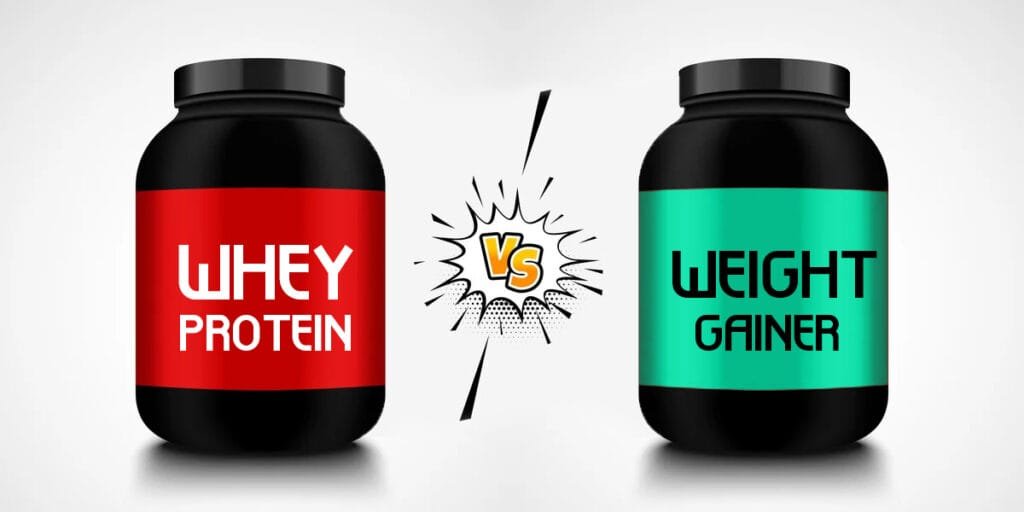
When it comes to supplements, the fitness world offers a plethora of choices, and two of the most popular options are whey protein and weight gainers. While both serve as nutritional aids, they cater to distinct goals and have different compositions. This blog explores the key differences between whey protein and weight gainers, helping you decide which one aligns with your fitness objectives.
What is Whey Protein?
Whey protein is a high-quality protein derived from milk during the cheese-making process. It is rich in essential amino acids, particularly branched-chain amino acids (BCAAs), which are crucial for muscle repair and growth.
Key Features:
- High Protein Content: Typically contains 20-30 grams of protein per serving.
- Low in Calories: Usually ranges between 100-150 calories per serving.
- Minimal Carbohydrates and Fats: Designed to provide lean protein without additional macronutrients.
- Fast Digesting: Quickly absorbed by the body, making it ideal for post-workout recovery.
Who Should Use Whey Protein?
- Muscle Building: Ideal for those focused on increasing muscle mass and improving strength.
- Fat Loss: Helps maintain muscle while reducing body fat due to its low-calorie content.
- Supplementing Daily Protein Intake: Useful for individuals struggling to meet their protein requirements through diet alone.
What is a Weight Gainer?
Weight gainers are calorie-dense supplements designed to help individuals increase their overall calorie intake. They are typically composed of proteins, carbohydrates, and fats in varying proportions.
Key Features:
- High-Calorie Content: Can provide 500-1,200 calories or more per serving.
- Protein, Carbs, and Fats: Includes a balanced ratio of macronutrients, with carbs often making up the majority of the calories.
- Rich in Carbohydrates: Often contains maltodextrin or similar carb sources for quick energy.
- Bulk Support: Aimed at individuals with high-calorie needs who struggle to gain weight.
Who Should Use Weight Gainers?
- Hard Gainers: Perfect for those with a fast metabolism who find it challenging to gain weight.
- Bulking Phases: Beneficial during muscle-building phases where calorie surplus is required.
- Convenient Calorie Boost: Ideal for those who can’t consume large quantities of food to meet calorie goals.
Key Differences Between Whey Protein and Weight Gainers
| Aspect | Whey Protein | Weight Gainer |
|---|---|---|
| Primary Goal | Muscle repair and lean muscle growth | Weight and muscle mass gain |
| Calorie Content | Low (100-150 calories) | High (500-1,200+ calories) |
| Macronutrient Focus | High protein, low carbs and fats | Balanced, carb-heavy |
| Digestive Speed | Fast | Moderate to slow |
| Usage | Post-workout or daily protein intake | Meal replacement or calorie surplus |
| Ideal For | Cutting, maintenance, lean muscle gain | Bulking, weight gain |
Potential Downsides
- Whey Protein:
- Not suitable as a primary calorie source for those needing a surplus.
- May cause digestive discomfort in individuals with lactose intolerance (opt for whey isolate).
- Weight Gainer:
- High sugar and carb content can lead to fat gain if not paired with proper training.
- May cause bloating or digestive issues due to high calorie density.
Choosing the Right Supplement
- Evaluate Your Goals:
- If your aim is to build lean muscle or maintain weight, whey protein is a better choice.
- If you need to gain weight or bulk up, weight gainers can provide the extra calories you need.
- Consider Your Diet:
- Use whey protein if your diet already provides sufficient calories but lacks protein.
- Opt for weight gainers if you struggle to consume enough calories through food alone.
- Training Regimen:
- For high-intensity workouts focused on muscle definition, whey protein is ideal.
- For heavy lifting and muscle mass, weight gainers complement your calorie needs.
Final Thoughts
Both whey protein and weight gainers serve unique purposes in fitness and bodybuilding. Understanding their differences and aligning them with your personal goals and dietary needs is key to making the right choice. Remember, supplements are just that—supplements. A well-rounded diet and consistent training regimen are the foundations of any successful fitness journey.

